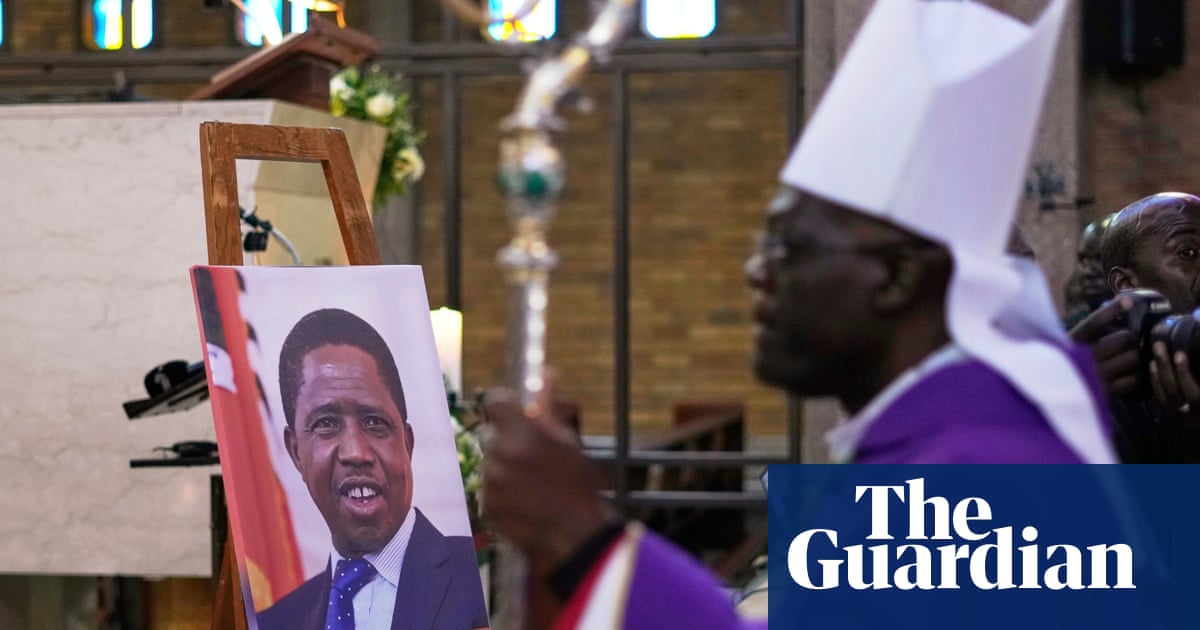A Nation in Limbo: The Unfinished Farewell of Zambia's Edgar Lungu

In a dramatic twist that underscores the ongoing political tensions in Zambia, the funeral of former President Edgar Lungu was abruptly halted, leaving mourners in a state of uncertainty at the Cathedral of Christ the King in Johannesburg. The unexpected interruption came as a Pretoria high court judge issued an order to suspend the burial, following a last-minute intervention by Zambia’s attorney general. The scene was one of palpable tension, with Lungu's widow arriving visibly distressed, as a mass was held in lieu of the anticipated funeral service.
The court's decision mandates a full hearing on August 4, a delay that prolongs the public spectacle of a feud that has persisted beyond Lungu's death. Lungu, who governed Zambia from 2015 until 2021, passed away in South Africa at the age of 68 after an undisclosed illness. His family has disclosed that Lungu expressly wished for his successor, President Hakainde Hichilema, to be absent from his funeral. This request clashed with the Zambian government's plans for a state funeral, which would traditionally be led by the sitting president.
Attorney General Mulilo Kabesha, speaking to the Zambia National Broadcasting Corporation, emphasized the legal requirement for state funerals to include full military honors, citing a precedent set by a local court ruling regarding the burial of Zambia’s first president, Kenneth Kaunda. Kabesha articulated, "The high court ruled that a former president is not a private arrangement, is not private property, is national property and his burial should be handled by the state. The moment that a national mourning is declared, the law kicks in."
Court documents reveal that a grave had already been prepared for Lungu in the national cemetery, a resting place for all former Zambian presidents. This marks the third time a state funeral for Lungu has been called off. The political animosity between Lungu and Hichilema dates back to the fiercely contested 2021 election, which saw Hichilema emerge victorious after a previous defeat in 2016. Their rivalry intensified in 2017 when Hichilema was imprisoned for four months on treason charges after his convoy allegedly obstructed Lungu’s motorcade, a charge that was later dropped amidst international condemnation.
Since assuming office, Hichilema has been accused by Lungu of orchestrating a campaign of harassment, which included allegations of house arrest. In a controversial move earlier this year, police curtailed Lungu's public jogging activities, labeling them as "political activism" requiring prior approval.
Adding to the family's woes, Esther Lungu, the former first lady, and their children have been embroiled in legal battles over corruption allegations. Esther Lungu, facing charges of car theft, has maintained her innocence, with a court appearance scheduled for this week.
Edgar Lungu's attempt to re-enter the political arena was thwarted last year when Zambia’s constitutional court ruled that his initial term, following the death of then-President Michael Sata in 2015, constituted a full term, disqualifying him from future presidential bids.
The unfolding drama surrounding Lungu's funeral is a microcosm of the broader political discord that continues to shape Zambia’s national narrative, reflecting deep-seated divisions and the ongoing struggle for political dominance.
Associated Press contributed to this report.
🔮 Fortellr Predicts
Confidence: 75%
The current impasse surrounding Edgar Lungu’s burial is a reflection of Zambia’s unresolved political tensions and the enduring rivalries from the Hichilema-Lungu conflict. The judicial intervention, halting Lungu's burial, demonstrates the Zambian judiciary's assertive role in mediating political issues, particularly those involving state affairs and former leaders. This move might be perceived as an opportunity by President Hakainde Hichilema to reassert state control over national protocols, potentially strengthening his government's authority. The legal battle over Lungu's funeral arrangements also illustrates the entrenched divisions within Zambia’s political landscape, highlighting the fragility of its post-election peace. The ongoing controversies, including the corruption charges against Lungu’s family, threaten to exacerbate existing political rifts, which could increase polarization and public dissent. Simultaneously, the international community will closely watch these developments to gauge Zambia’s commitment to democratic principles and legal integrity, given that similar past events in other African nations have often set precedent for shifting political landscapes and democratic stability. Furthermore, the unresolved burial situation could impact Zambia’s economic outlook, as investor confidence might wane due to perceived political instability. The scenario necessitates deft handling by the Zambian government to avoid further exacerbating tensions, especially in light of regional examples where posthumous disputes over former leaders have led to significant political unrest.